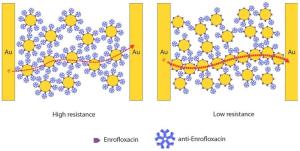“Our biochemiresistor was able to detect enrofloxacin in neat milk in 40 minutes”
A whole new class of biosensor that can detect exceptionally small traces of contaminants in liquids in just 40 minutes has been developed by a UNSW-led team of researchers.
Known as a biochemiresistor, it meets a long-standing challenge to create a sensor that is not only super-sensitive to the presence of chemical compounds but responds quickly. It has countless potential uses for detecting drugs, toxins and pesticides for biomedical or environmental analysis.
In a paper published in the chemistry journal Angewandte Chemie the researchers describe how they successfully tested the new sensor by detecting tiny traces in milk of the veterinary antibiotic enrofloxacin. The journal has singled out the study for attention as a “Very Important Paper.” Only 5% of papers published by the journal are so designated.
“Enrofloxacin is an antibiotic used in the agricultural industry that can be transferred to the food chain,” notes co-author Scientia Professor Justin Gooding, of the UNSW School of Chemistry and the Australian Centre for Nanomedicine.
“Our biochemiresistor was able to detect enrofloxacin in neat milk in 40 minutes, at level as low as one nanogram in a litre of milk. To put that number in perspective, a nanogram is a billionth of a gram and is the mass of a single cell.
“While that is impressive enough, the sensor is a general concept that can be widely applied across many different fields.”
A biosensor is a portable analytical device that uses biological molecules to detect selectively just one compound within a mix of many others. Small biosensors are already in daily use testing the safety of drinking water, for checking diabetic blood-sugar levels and for pregnancy tests.
via Science Daily








